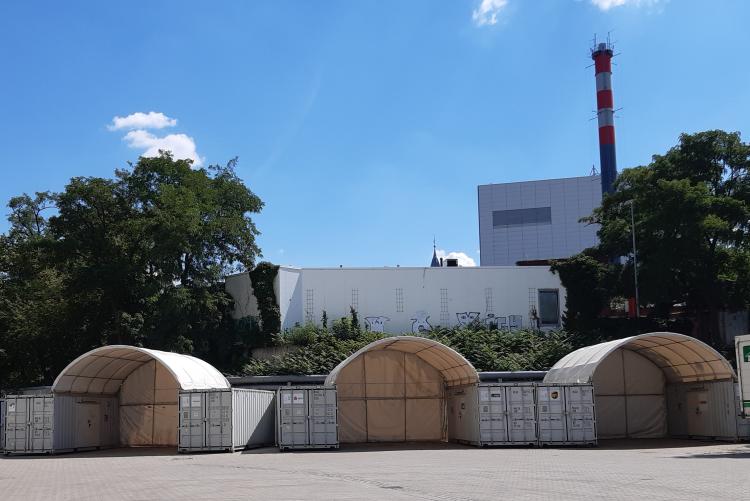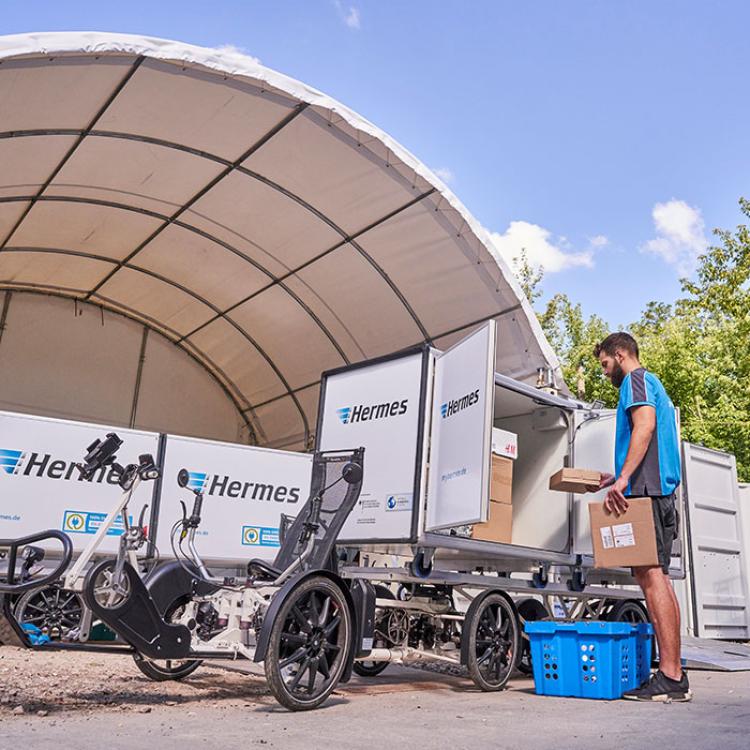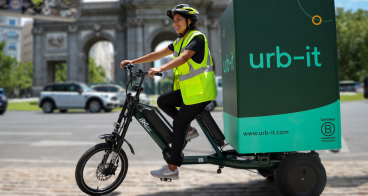Decarbonising urban logistics with cooperative micro-depots in Berlin

The Challenge
Before the implementation of the KoMoDo project, Berlin—particularly densely populated districts—was increasingly burdened by the logistical impacts of a booming e-commerce sector. The surge in parcel volumes led to a growing number of delivery vehicles in the city, resulting in multiple urban challenges. These included not only traffic and environmental concerns, but also systemic inefficiencies in last-mile logistics. The following critical issues were identified:
- Urban congestion: delivery vehicles, while constituting only a quarter of city traffic, accounted for 80% of traffic. This was due to factors like curbside parking, oversized transport vehicles blocking narrow streets and encroachment into bike lanes, creating hazards for cyclists.
- Environmental impact: the surge in delivery traffic contributed to increased carbon emissions and noise pollution. Without intervention, emissions from urban deliveries were projected to rise by over 30% by 2030, with a corresponding 21% increase in traffic congestion.
- Operational inefficiencies: the absence of centralised delivery hubs led to inefficiencies, including longer delivery times and higher operational costs. The lack of optimised delivery routes and coordination among various courier services further strained the city's logistics infrastructure.
These challenges underscored the need for innovative solutions to streamline urban logistics, reduce environmental impact, and improve the efficiency of last-mile deliveries.
The Solution
The KoMoDo project sought to address these challenges by implementing a shared, collaborative micro-depot system for last-mile delivery. The solution centralised the delivery process and reduced the number of delivery vehicles on the road, directly tackling congestion, environmental impact, and operational inefficiencies. Key characteristics of the solution included:
- Shared micro-depots: KoMoDo established a central micro-depot in Berlin, which was used collaboratively by multiple courier companies (such as DHL, UPS, and DPD). This allowed for the consolidation of deliveries, reducing the need for individual vehicles to navigate congested urban streets.
- Cargo bikes: to further reduce environmental impact, KoMoDo utilised electric cargo bikes as alternative to traditional delivery vans for the final leg of the delivery. These bikes are smaller, more manoeuvrable, and produce zero emissions.
- Coordinated logistics: by bringing different couriers together to share infrastructure and routes, KoMoDo optimised delivery schedules and reduced redundancies, minimising traffic disruption and improving delivery times.
- Urban integration: the micro-depot was strategically located in a dense urban area, where parcel volumes were highest, ensuring the solution was both effective and scalable.
- Reduction in traffic and emissions: KoMoDo reduced the number of delivery vehicles on the road, directly alleviating congestion and cutting emissions, in line with Berlin’s sustainability goals.

Making an impact
The KoMoDo project delivered significant impacts, with measurable results in three key areas:
- Social impact: by reducing the number of delivery vehicles in urban districts, the project contributed to safer streets for pedestrians and cyclists. Centralising deliveries into a shared micro-depot reduced congestion and improved street safety and air quality in Berlin’s high-density areas. Reduced noise pollution from diesel vans improved quality of life for local residents, and local authorities highlighted the reduction of traffic-related hazards.
- Ecological impact: The project successfully replaced delivery vans with electric cargo bikes for the last mile of deliveries, significantly reducing emissions. Over 12 months, more than 160,000 parcels were delivered using electric cargo bikes, covering a total distance of 38,000 km. This resulted in a reduction of approximately 11 tonnes of CO₂ compared to conventional van deliveries, demonstrating the potential for cargo bikes to reduce pollution and promote greener urban logistics.
- Economic impact: By centralising deliveries in a shared micro-depot and using electric cargo bikes, participating companies such as DHL, DPD, and UPS achieved cost savings through optimised routes and reduced fuel consumption. The shared infrastructure improved efficiency, reducing the number of trips required and improving overall delivery times. The project provides a model that could scaled and replicated in other cities facing similar challenges.

Lessons learnt
One key difficulty was coordinating deliveries across multiple courier companies. Each company had its own operational processes and schedules, which made aligning these systems and ensuring smooth cooperation in a shared micro-depot model quite complex. This issue required significant upfront planning, highlighting the need for a unified digital platform or better integration of operational tools between couriers to enhance coordination and reduce delays in future projects.
Another challenge was identifying suitable locations for the micro-depots. The location had to be easily accessible, large enough to store goods, and situated in areas of high delivery demand. However, the high cost of real estate in Berlin made finding a cost-effective, functional space difficult. Future projects should carefully consider the spatial and infrastructural needs of urban logistics and allow more flexibility in location choices, factoring in real estate costs and logistical demands.
The success of the KoMoDo project also relied heavily on public and policy support. Government policies, such as subsidies for electric cargo bikes and the creation of dedicated cargo-bike-only parking spaces, played a significant role in the project's success.
The project demonstrated strong potential for scalability. However, scalability depends on the willingness of cities to adapt their infrastructure and integrate similar micro-depot systems, calling for careful consideration of local policy frameworks.






